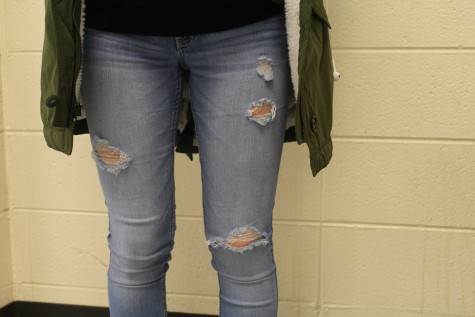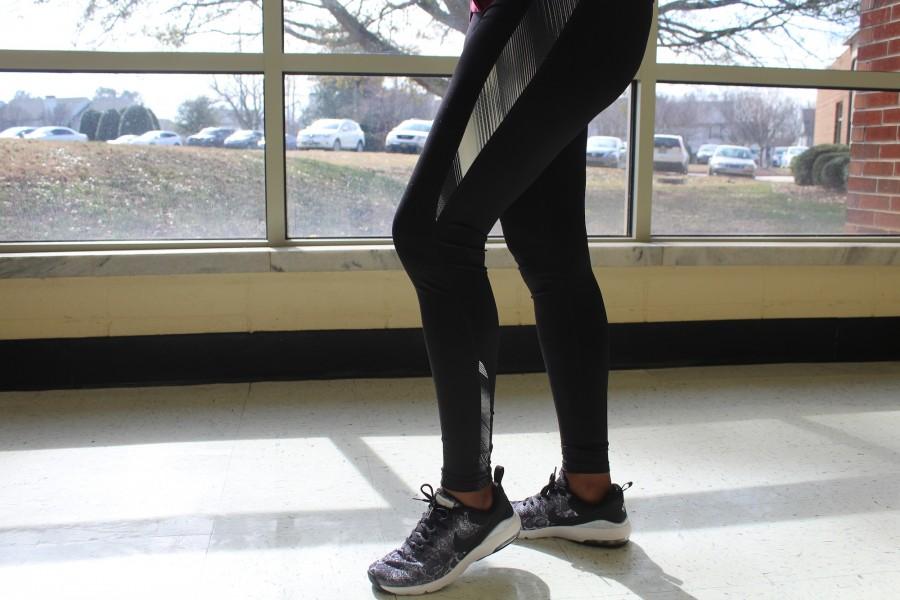Do my shoulders distract you?
Leggings cover all areas of the leg and buttocks, and yet they still are banned. And yet people break this rule all the time.
February 5, 2016
School dress codes, especially for teenage girls, limit creativity and shadow individuality for the sole purpose of diminishing “exposure.” Who wants obscenities screamed across rooms, vulgar comments whispered, or even crazed rants directed at them simply because of what girls wear? The immense pressure put on adolescent females by societal and cultural norms creates a less than comfortable learning environment, and one that supports critical judgement of youth.
“The second week of school this year, we had our first ‘dress-code roundup.’ Our new principal came over the announcements during class and told the teachers to begin. I was wearing a dress because I had a volleyball game that day, and my teacher came around my desk, made me stand up in front of the class, then sent me to the principal’s office! I got dress coded when I got there,” Woodstock High School junior Arin Breitbart, said.
This systematic stripping of self-esteem renders young girls vulnerable to the outside world, and prioritizes sexuality over education.
Think of this situation, one that inhibits many females on a daily basis, as a game they simply cannot win. When authority figures remove girls from their learning environments, they simultaneously take away precious class time that could possibly alter a student’s grade in the long run. By doing this, the authority figure agrees and condones male superiority in the classroom; the whole purpose of dress code serves, primarily, men.

Rips in jeans are less distracting than being publicly shamed for having them.
When asked about her experiences with dress code at North Cobb, junior Lily Stallings said bluntly “I think it’s stupid because most teachers don’t even enforce it. If you’re gonna have a dress code, you can’t have it be so that whether you get in trouble or not depends on what teacher you have. I’ve never been dresscoded, but I’ve definitely broken it.”
As stated in the dress code section of the Cobb County student handbook: “[a student] will refrain from any mode of dress which is distracting to classroom instruction or which contributes to the disruption of the normal function of the school.” Dress-code serves as a parameter to ensure the learning environment remains free of distraction, but distraction for who? And at what cost? And even worse, the section states “school officials will make the interpretation of what is acceptable dress,” meaning the emphasis on young girls’ attire falls under the opinions of those in authority.
“I wore a cute, snazzy, little dress. I got stopped in the atrium and a teacher said that my legs were ‘too long’ to wear that dress. We argued and argued, and she told me to change. So I put on my Nike shorts, which had already been under my dress, and she said I looked much better,” Ryan Burke, a sophomore at Reinhardt University, comments on her high school experience with dress-code. “She was so pissed when I told her the shorts were actually on under my dress and that means I’m wearing something shorter now. I said ‘how do my legs look now?,’ and she sent me to the principal’s office.”
The real world does not abide by the dress-code, as one will find that women in the media wear short skirts, tank tops, and tight dresses on a daily basis without receiving chastization for their attire. If the world outside of school adhered to the laws imposed on students, it would fall under the category of misogyny and deemed oppressive.
No one would tolerate such ludicrous criticisms in the twenty first century outside of public school in the so-called “real world,” so why should students?









Madison Padgham • May 11, 2018 at 7:31 PM
I am currently writing a report on dress codes. I do understand the idea that school should be a professional environment, but at the same time, it should also be a place where kids can wear comfortable clothing. A long sleeved shirt in 90 degree weather is not comfortable, and also brings distraction into the equation. Even more, a nice tank top should be considered professional. There is no reason it shouldn’t be. Ultimately, the distraction and unprofessional-ness of school attire is determined by how we see it.
Jacob Tutterow • Feb 26, 2016 at 10:04 AM
The thing out the dress code in school is that they want schools to be a professional environment, and by having ripped jeans, and other clothing that may be what could be considered ‘revealing’ would be going against that idea of a professional environment.
Katelyn Skaer • Mar 3, 2016 at 11:41 AM
I’ve worn things to work and meetings that I can’t wear to school. If it was *really* about professionalism, guys wouldn’t be allowed to walk around with picks in their hair, and business attire would be mandated.
Jacob Tutterow • Mar 11, 2016 at 9:19 AM
Of course there are going to be some businesses and other things that don’t require you to wear clothes that would you would be required to wear at school, seeing as how every business is different. That being said, I wasn’t implying suit and tie professional attire. I meant that every school is meant to prepare students for their future, and in most, but not all cases, you will have to wear clothing close to what schools would require, or even stricter. Plus, in this world of sex appeal being a major factor in our culture, our hormones do go crazy during these teenage years, and somebody with even their shoulders out could set them off and impair their learning.
Cintia • Feb 5, 2017 at 7:51 PM
Shoulders are a normal part of the body everybody has. Nobody gets set off because of that.